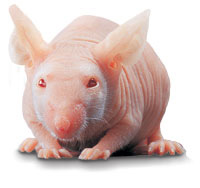Tumor Studies
Tumorigenicity
The tumorigenic potential of a cell line can be assessed by using either the in vivo nude mouse testing model, or in some cases, the in vitro soft agarose assay.
It is important to ensure that a cell substrate does not contain oncogenic potential. If a vaccine is manufactured in a cell substrate that was derived from a tumor or has a tumorigenic phenotype it could have a higher risk of containing oncogenic substances. Oncogenicity testing of cell lysates and DNA in rats, mice, and hamsters is available.

This protocol determines whether a cell line is tumourigenic in nude mice. Nude mice were selected because tumor cells can grow in these immunocompromised animals. Subcutaneous administration was selected due to the ease of detecting developing tumor nodules.
Product to be tested: cell banks, Sample: 1 ml vial at 107 cells/ml/animal, Assay duration: 12 weeks
Tumourigenicity Potential in nude mice: According to Regulatory guidelines EP5.2.3
This protocol determines whether a cell line is tumourigenic in nude mice. Nude mice were selected because tumor cells can grow in these immunocompromised animals. Subcutaneous administration was selected due to the ease of detecting developing tumor nodules. A group of 10 animals is inoculated with 107 cells suspended in 0,2 ml. A group of 10 animals is inoculated with Hela or other cancer cell lines as a positive control.
Product to be tested: cell banks, Sample: 1 ml vial at 107 cells/ml/mice, Assay duration: 12 weeks
For other tumor studies, please choose from the above menu
